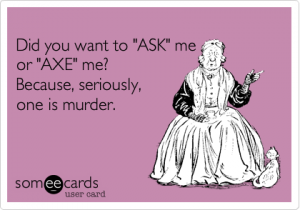Language is a beautiful thing. We use it every day to translate our thoughts and convey our feelings to our fellow human beings, and that has undoubtedly helped us to progress as a species. But the use of language is not without its flaws; words get mixed up and can be misunderstood if people don’t know how to use them properly. So just for fun, here are four words that are commonly misused in speech and/or writing in the English language. Enjoy!
1) If you have a question, please don’t “axe” me…
 OK, I know people aren’t really trying to say “axe” in this context, but the common mispronunciation of the word “ask” still bothers me enough to warrant a place on this list. I admit that I cringe a little whenever I hear someone say they want to “aks” a question; every time, the editor in my head screams “Ask! Ask! ASK!” Yes, I understand that people in different regions have different ways of speaking, and old habits are hard to break. But that doesn’t make this mistake OK.
OK, I know people aren’t really trying to say “axe” in this context, but the common mispronunciation of the word “ask” still bothers me enough to warrant a place on this list. I admit that I cringe a little whenever I hear someone say they want to “aks” a question; every time, the editor in my head screams “Ask! Ask! ASK!” Yes, I understand that people in different regions have different ways of speaking, and old habits are hard to break. But that doesn’t make this mistake OK.
So if you have a question, please don’t “axe” me. I don’t want to die.
2) “Defiantly” is not an alternative spelling for “definitely”.
Of all the spelling mistakes I come across regularly, this is one of those that bug me the most. Every time I see it made, a part of me wants to explain to the so-called language offender that “defiantly” and “definitely” are two completely different words that should never be confused. But people probably don’t notice the mistake because the spellings are so similar, or worse, they assume that one word is the same as the other because the error is so common.
Remember: “defiantly” means “showing open resistance”, while “definitely” means “without doubt”. Hopefully you can “definitely” love someone, but you don’t have to love them “defiantly”!
3) “Ironic” doesn’t mean what you probably think.
I’ve noticed that people sometimes like to use the word “ironic” as a synonym for “sarcastic”. But even though these adjectives have similar meanings, they’re not actually interchangeable, at least in a formal sense. Yes, the definition of “sarcasm” is “the use of irony to mock or convey contempt”, but the uses of these words in speech are still distinct. The best known meaning of the word “ironic” is “happening in the opposite way to what is expected”. Thus, irony is often used as a more harmless humor technique compared to sarcasm.
So whenever you describe an event as “ironic”, you may want to consider whether you really mean “sarcastic”, or vice-versa. ‘Cause you know, it’s sooo ironic when human beings make mistakes.

Even Windows has a sense of irony…
4) If you had “literally” died, you wouldn’t be here to tell the story!
Ryan: Did you see that? What just happened? That was literally a train wreck!
Steven: No, Ryan, it was figuratively a train wreck.
– Go On (Season 1, Episode 12 – “Win at All Costas”)
We all probably know someone who tends to overuse the word “literally” when speaking. “It was literally the best pizza in the world!” “It’s literally a million degrees today!” “The interview was literally a train wreck!” Over time, the word has become a common adverb for conveying exaggeration. However, although it’s technically acceptable in an informal way, “literally” shouldn’t really be used for emphasis, as it means “in the exact sense, without metaphor or allegory”.
So no, the wasp was not “literally” the size of a helicopter. No, you did not “literally” jump out of your skin at the sight of it. And no, you did not “literally” die of embarrassment when everyone laughed at you for running away. Otherwise, the military would be after that giant insect, you’d be an undead heap of raw meat and bones, and everyone would be feeling a horrible mix of confusion and guilt for having killed you with laughter!
What are your thoughts on these misused words? Any others you would add to this list?


Trackbacks/Pingbacks